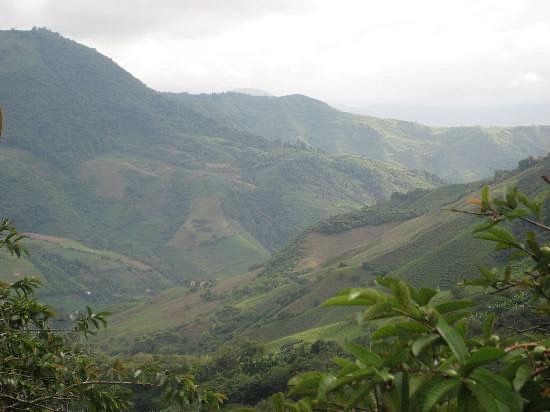Pasto, Columbia March 17 - 20, 1979
Fantastic day of hitching today. I got a ride in a big open cattle truck, perched on bundles of sacks, enjoying the feeling and freshness of the wind in my face, the immediacy of the elements (but glad it didn’t rain...). We snaked our way along the mountain roads, through steep green valleys, dark unplanted fields, or fields of corn, past tin, tar-paper and bamboo shanties, all selling Castalia and Coca-cola. Flowers encircling every house.
The first ride took around 3 hours, dropping me off at a truck-stop café where the owners were watching a Columbian-style ‘dance party’ on TV. A gang of kids (all theirs?) were dancing and twirling all over the front porch cum living room cum rec room cum café where I sat, an audience of one, and had a much appreciated café con leche. I spied a stream not far below the house, and headed down there with the lovely brown bread that Anamaria had given us last night. Tore off chunks and ate them with my usual combination of local farmer’s cheese and slices of tomato and onion. I never tire of this tasty, wholesome, easy, cheap and safe, in terms of whatever bugs might be lurking on the hands of ‘chefs’ and ‘waiters’ (usually one and the same person).
The next ride – again in a big open truck, and again in the back with the wind in my hair – took me the rest of the way to my destination: Pasto, on the border with Ecuador. We stopped once for pop at a bamboo shanty in the middle of nowhere. Dirt floor, wooden bench. One shelf of pop, all lime. The woman who ran the place wanted to give me her two-year-old son as a ‘regalo’. Such a cute kid I was tempted… and she might actually have gone through with it. It’s hard to imagine that kind of desperation, and what a mother’s love for her children might drive her to do... .
The three ‘drivers’ of the truck eschewed the lime pop and instead downed about three aguardientes apiece. They were not exactly drunk, but they weren’t entirely sober either. I was glad they had each another to at least keep themselves awake, if not alert. About an hour out of town we picked up a group of school children who piled into the back and immediately started a game of hacky-sack. The bouncing and jolting of the truck didn’t seem to phase them at all. At one point, when the sack came my way, I tried to get a kick at it, but missed wildly, much to the amusement of the kids. Their laughter was good natured, and when they got down they all wished me ‘que lo vaya bien’ (I hope it goes well with you).
This ride, more than any other so far, got me thinking about the truckers, and the roads down here. The narrow winding, unpaved, shoulderless road we’d just traveled is their BIG road, the only highway in the country. It clings to the mountain slopes. There is frequent evidence of landslides above, below, and sometimes still on, the road. And it is shared with pedestrians, cyclists, horses, cows, a few private cars and a fair number of other trucks and buses, almost all of which are old with unreliable engines, tires, brakes, steering and drivers. It’s no wonder that truckers are so revered here: what they’re doing, every day, is dangerous, truly treacherous. I wonder how many lives are lost in accidents on these roads? I see crosses by the side of the road, often with fresh flowers. How many died here?
And yet the truckers go on, providing a lifeline to all these little communities, all these little isolated families. Providing transportation of goods and people, and even gringos like me. And we did make it, unscathed, to Pasto. From the hilltop I can see all the way to Ecuador, just another bus or truck ride away.











Comments
Post a Comment